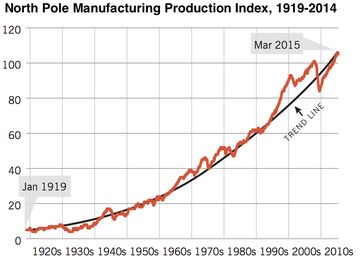Elves Face Unprecedented Threat From Artificial Intelligence
EghtesadOnline: My daughter had been hounding me for days to mail Santa Claus her Christmas list, but I kept putting it off. Then this week, she had a change of heart and told me it’s OK if we wait until the last minute, because “most of the toys are made by machines, and the elves just have to turn them on.”
Even a five year old, it seems, understands how modern manufacturing has changed, and her insight got me thinking about the future of elf jobs. With advances in automation and machine-learning, elf technology is getting really good. Engineers are focusing their efforts on designing “the machine that builds the machine,” promising to spit out toys as fast as bubbles from a bubble machine. But where will that leave elves who've spent generations pounding out toys in the workshop?

According to Bloomberg, North Pole manufacturing jobs have fallen to the lowest levels in 70 years even as toy output is at or near record highs. The problem isn’t outsourcing—it’s automation, which accounts for about 88 percent of these losses between 2000 and 2010, according to a study by Ball State University researchers.
And it’s only going to get worse. Soon, automation will supplant truck drivers, retail workers, and even lawyers and accountants. Almost half of today’s jobs are at risk of being replaced in the next two decades by robots and artificial intelligence, according to an Oxford University study.
The White House published a report this week about the future of artificial intelligence and the economy, and warns that “in the next 20 years, it is to be expected that machines will continue to reach and exceed human performance on more and more tasks.” Creative skills may remain safe for a bit longer, but the automation of a wide swath of the global economy is inevitable. Adaptation to new jobs will be crucial in the short term, but eventually the very tenets and institutions of capitalism may require dramatic intervention.
The economy is headed for an evolutionary meteor blast on par with the industrial revolution. That upheaval improved quality of life the world over, but it was accompanied by tremendous suffering as generations of artisans were pushed out of the their professions by more efficient factory lines.
The coming workplace revolution might similarly raise the collective well-being of of humanity, but there’s no guarantee. Broadly speaking, 19th century industrialization bestowed the biggest productivity increases on lower-skilled workers, giving birth to the modern middle class. But by the end of the 20th century, the benefits of the computer age were falling disproportionately upon higher-skilled workers who were already doing pretty well for themselves. That’s likely to continue.
“Technological innovation over this period increased the productivity of those engaged in abstract thinking, creative tasks, and problem-solving,” stated the White House report. “Shifting demand towards more skilled labor raised the relative pay of this group, contributing to rising inequality.”
Automation isn’t the only threat facing the elves. Climate change is dramatically reshaping the Arctic, warming it twice as fast as the global average. Ice levels have receded for decades and are currently setting new record lows for this time of year. This Christmas Eve, a normally frigid time when ice should be accumulating, North Pole temperatures are expected to reach an astonishing 30 to 50 degrees Fahrenheit above normal. Real estate for Santa’s workshop is getting harder to come by.

These are the twin threats of our age—the transition to an automated economy, and climate change—and the elves up north are feeling the worst of it. The average elf’s dream of putting in a good day’s work building toys in exchange for a happy life and a sense of contribution is in peril.
But making automation work for us, and reducing the impact of climate change with clean energy and electric cars, are also our biggest opportunities. So this Christmas, spare a thought for the little ones and what we can do to help.


